Since 2018, I-TECH has supported the Ukraine Ministry of Health (MOH), through the MOH Public Health Center, in introducing and adopting WHO-recommended safe and effective antiretroviral therapy (ART) regimens.
Category: Ukraine
Assisted HIV Partner Notification/Index Testing in Ukraine
Since 2019, I-TECH has provided increased technical assistance for 39 state healthcare facilities in eleven high HIV burden regions of Ukraine to advance assisted partner notification/services and index testing as a sustainable strategy for HIV case finding.
Continue reading “Assisted HIV Partner Notification/Index Testing in Ukraine”
HIV Pre-Exposure Prophylaxis (PrEP) in Ukraine
The Government of Ukraine prioritized pre-exposure prophylaxis (PrEP) as part of combination prevention for HIV in 2019.1 Since 2020, I-TECH has focused its programmatic efforts in Ukraine on improving PrEP services uptake and strengthening PrEP delivery at selected stat healthcare facilities.
Continue reading “HIV Pre-Exposure Prophylaxis (PrEP) in Ukraine”
I-TECH Ukraine Hosts First Index Testing Forum Following Launch of National Index Testing Program

On December 18, 2019, I-TECH Ukraine facilitated its first forum on index testing, a key strategy used to identify and support HIV-positive individuals. Service providers, as well as representatives from the US Centers for Disease Control and Prevention (CDC) and the Public Health Center (PHC) of the Ministry of Health (MOH) of Ukraine, attended the forum and participated in discussions detailing the best ways to implement and adapt proven index testing methodologies in Ukraine.
I-TECH Ukraine rolled out its national program in October 2019, after shifting its programmatic focus to provide index testing development and quality assurance. The program was launched at 39 antiretroviral therapy (ART) clinics in 11 PEPFAR priority regions across the country.
The recent forum included a review of early program performance; identification of best practices that can be scaled up to improve index testing and partner notification performance; and solutions to key challenges that index testing providers are currently facing in Ukraine.
“The index testing strategy gives us all high hopes that we can reach out to the most affected groups of people living with HIV and identify many individuals in need of care much earlier than it happens currently in Ukraine,“ says Anna Shapoval, I-TECH Ukraine Country Representative. “As always, I-TECH is proud to build this new programming not just on the vast evidence and globally acknowledged best practices but also on the mountain of successful experiences in other countries where index testing programs have been initiated and implemented by I-TECH in previous years.”
To strengthen the programmatic response, the forum included a number of speakers and index testing subject matter experts. Dr. Serhii Riabokon, an infectious disease doctor in the PHC’s department of the coordination of treatment programs on HIV, viral hepatitis, and sexually transmitted infections, presented the current legal framework and the state of index testing program implementation in Ukraine. I-TECH’s program and evaluation teams also gave a brief overview of the program including the design as well as the successes and challenges to date. Four well-performing regional sites were also able to share the best practices they used during early program implementation.
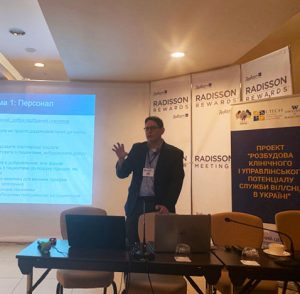
In addition to the index testing program-specific presentations, the forum also included presentations by experts who shared their valuable experiences in partner services implementation, scale-up, and development:
- Matthew Golden, MD, MPH, Professor at the University of Washington (UW) Department of Medicine’s Division of Allergy and Infectious Diseases and I-TECH faculty member, reviewed the development and challenges of partner services programs around the world, as well as voiced practical recommendations for Ukrainian index testing advancement.
- Nancy Puttkammer, PhD, MPH, I-TECH faculty and DIGI faculty lead, and Jason Beste, MD, MPH, I-TECH International Clinical Advisor, were on a panel discussion on the ways of overcoming key challenges in index testing implementation.
“A key part of the program is to ensure quality results,” says Shapoval, “and consistent and collaborative learning is paramount to building local capacity.”
December’s forum is just the first of planned, quarterly forums designed to further build local capacities around index testing and quality assurance.
THIS PROJECT IS SUPPORTED BY THE HEALTH RESOURCES AND SERVICES ADMINISTRATION (HRSA) OF THE U.S. DEPARTMENT OF HEALTH AND HUMAN SERVICES (HHS) UNDER U91HA06801, THE INTERNATIONAL AIDS EDUCATION AND TRAINING CENTER (IAETC). THE CONTENT OF THIS POST IS THE AUTHOR’S AND SHOULD NOT BE CONSTRUED AS THE OFFICIAL POSITION OR POLICY OF, NOR SHOULD ANY ENDORSEMENTS BE INFERRED BY HRSA, HHS OR THE U.S. GOVERNMENT.
I-TECH Ukraine Initiates National Discussion on Performance-based Incentives Model in HIV
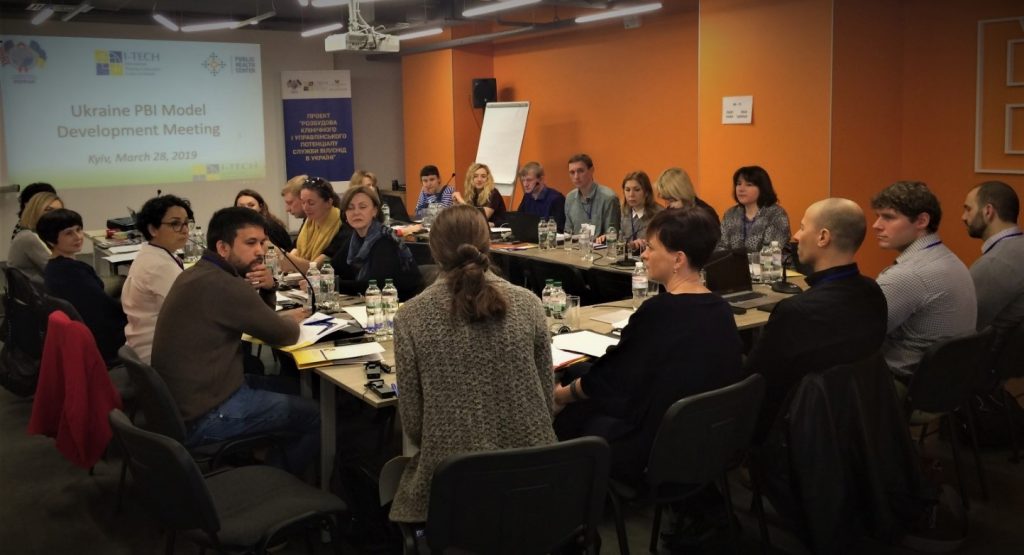
In response to the need to quickly revitalize efforts to reach targets in Ukraine, CDC Ukraine has asked International Training and Education Center for Health (I-TECH) to support a performance-based incentive (PBI) model.
On March 28, 2019, I-TECH facilitated a high-level stakeholder workshop centered on PBI evidence and “best practices.” Participants from the U.S. Centers for Disease Control and Prevention (CDC) in Ukraine and the Public Health Center (PHC) of the Ministry of Health of Ukraine, and I-TECH gathered to discuss options for adapting proven methodologies to Ukraine’s HIV services.
PHC launched the model in December 2018 at five pilot sites across the country. In the pilot, monetary incentives were paid to individual doctors at the facilities to double efforts toward initiating new patients on ART.
PHC plans to expand the model to all 12 priority regions in the country. On the heels of COP ’19 discussions in South Africa, CDC Ukraine is looking for additional areas of the HIV cascade to which PBI could be applied to reach the FY2020 targets set by the U.S. Office of the Global AIDS Coordinator (OGAC).
The March meeting and the preceding preparatory meetings provided catalytic opportunities for identifying additional HIV services–including index partner testing, linkage to care, and loss-to-follow-up search–that could potentially benefit from the PBI model; discussing lessons learned from other PBI global initiatives; and utilizing evidence-based practices to design well-conceived and context-driven programs.
Marianne Holec, Senior Program Manager for I-TECH Zimbabwe’s voluntary medical male circumcision program; Efison Dhodho, Results-based Financing Health Specialist from the Programs Coordination Unit of the Ministry of Health of Zimbabwe; and Charbel El Bcheraoui, PhD, Assistant Professor at the Institute for Health Metrics and Evaluation (IHME) were keynote speakers at the event.
These working meetings resulted in meaningful exchanges between the guest speakers and Ukrainian experts about the successes (e.g., an increase in short-term achievement of targets and the opportunity to identify and target largest areas of need) and challenges (e.g., workplace friction, dissatisfaction with incentives, lack of teamwork, and reduced quality of care) of PBI implementation globally and in Ukraine to date.
Meeting participants appreciated the practical advice given by the guest speakers on designing effective, intentional, and sustainable PBI models for the longer term for HIV services. Experts advised developing a well-designed program that is adapted to local context; starting at a few sites and try different strategies to see what works best; gathering input from the providers as to what will work best; building in health competition between sites; and having a strong M&E framework.
With input from local stakeholders and international experts, I-TECH Ukraine has accepted the challenge of incorporating the key outcomes from the series of PBI meetings to structure the Ukrainian PBI model for HIV services. This narrative will include an outline of additional technical assistance required around its implementation.
THIS PROJECT IS SUPPORTED BY THE HEALTH RESOURCES AND SERVICES ADMINISTRATION (HRSA) OF THE U.S. DEPARTMENT OF HEALTH AND HUMAN SERVICES (HHS) UNDER U91HA06801, THE INTERNATIONAL AIDS EDUCATION AND TRAINING CENTER (IAETC). THE CONTENT OF THIS POST IS THE AUTHOR’S AND SHOULD NOT BE CONSTRUED AS THE OFFICIAL POSITION OR POLICY OF, NOR SHOULD ANY ENDORSEMENTS BE INFERRED BY HRSA, HHS OR THE U.S. GOVERNMENT.
I-TECH Ukraine Trains Faculty in Innovative Teaching Methods and Principles
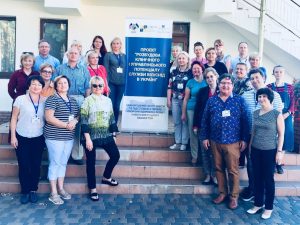
The International Training and Education Center for Health (I-TECH) Ukraine, in partnership with the Ukrainian Family Medicine Training Center of Bogomolets National Medical University, conducted a three-day training course for clinical educators on principles and innovative methods for effective teaching. The course was held outside Kyiv from 18-20 September 2018.
Facilitating the training were Ann Downer, EdD, I-TECH Executive Director and Professor in the University of Washington Department of Global Health, and Michael Reyes, MD, MPH, I-TECH co-founder and Professor in the University of California, San Francisco Department of Family and Community Medicine.
The course focused primarily on new teaching methods and stronger instructional design for clinical courses taught by faculty, especially those with content on HIV/AIDS, Tuberculosis, and malaria. The objectives included helping clinical educators to:
- strengthen learning objectives and measurement of student learning;
- vary their use of teaching methods; and
- revise lectures to make them more interactive.

The course modeled these objectives by using small group work and other teaching methods to increase engagement.
“Over the course of three days, I was able to learn techniques and best practices to actively engage my course participants into the learning process,” says Galyna Vynogradova, Associate Professor of the Ukrainian Family Medicine Training Center and participant of the training.
This training course is a part of a larger I-TECH effort to build the clinical and managerial capacity of HIV/AIDS service providers throughout Ukraine.
I-TECH Ukraine Conducts In-Service Nurse Training Pilots for Achieving 90-90-90
Recent public health care reform in Ukraine has called for the growing role of primary health care, task shifting, and decentralization of HIV services while providing care and treatment for people living with HIV (PLWH). In June 2018, the International Training and Education Center for health (I-TECH) Ukraine conducted two back-to-back, five-day in-service training programs on HIV testing services for two cohorts of participants from twelve regions across Ukraine.
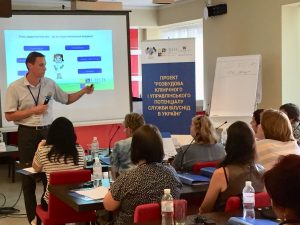
The concept and design of these unique pilot training programs were influenced by the recent reform to actively involve general practice/primary care nurses into the process of achieving UNAIDS 90-90-90 targets in Ukraine.
A group of 10 national HIV and health care reform experts, I-TECH’s international consultant-nurse practitioner, and the I-TECH Ukraine training development team carefully designed the learning objectives and content of the training program with consideration of the specifics of the national HIV epidemic, participant backgrounds, as well as anticipated task shifting. Together, these experts synthesized and presented international and national clinical and nursing best practices in the area of serving PLWH.
Training participants included nurses from primary care facilities, specialized HIV clinics, as well as faculty of seven local nursing colleges, including I-TECH Ukraine’s national partners – Ternopil State Medical University and the Nursing College of Poltava Ukrainian Medical and Dental Academy.
The training programs outlined roles for general practice/primary care nurses in achieving UNAIDS 90-90-90 targets, taught HIV basics, helped develop skills for HIV testing services with rapid HIV test kits, and coached participants on conducting counseling for PLWH using a non-discriminatory, patient-centered approach.
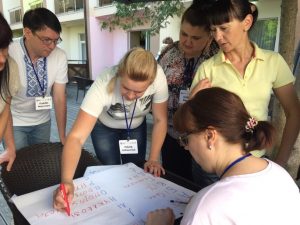
Facilitators used interactive training tools and approaches during the program to fully engage participants and strengthen the capacity of the nursing college’s faculty to teach up-to-date HIV content in an appealing and efficient way.
One of the central elements of the program was to educate the participating nurses about the challenges surrounding HIV-related stigma and discrimination with a major goal to overcome it in the nursing community and encourage respectful delivery of services for PLWH.
“[I-TECH Ukraine and its partners are] doing such a[n] important thing,” says Valentyna Borysova, lecturer of Zaporizhzhia Nursing College. “Educating nurses on HIV has been so much underestimated and under-invested in Ukraine.”
In addition to feeling as though this training addressed a critical gap in education, participants also provided positive feedback about the content and facilitation of the training, especially the parts of the training that were facilitated by the international and national peer nurses.
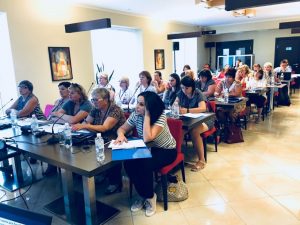
“The knowledge on testing and post-exposure prophylaxis are badly needed at our clinic,” says Liudmyla Samolelis, Senior Nurse of the Psychiatric Clinic in Poltava, Head of Poltava Oblast Nurse Association. “I plan to conduct an on-the-job training for the nurses, using the materials from the training.”
Due to the success of the pilot trainings, I-TECH Ukraine intends to finalize training materials, institutionalize the course through its local partners, and develop a manual that could be used in different training formats, including state-owned colleges and medical universities. In addition, an ambitious regional rollout of the training program is anticipated during the next year of the project.
Ukraine Partnerships
I-TECH began working in Ukraine in 2011 at the invitation of the U.S. Centers for Disease Control and Prevention (CDC) and the Ukrainian Ministry of Health. Today, I-TECH’s key partners in Ukraine include the Public Health Center (PHC) of the Ministry of Health (MoH) of Ukraine and the Ukrainian Family Medicine Training Center (UCFM) of the Bogomolets National Medical University (NMU) as well as 107 high- and low-volume regional ART sites, based at various healthcare facilities in twelve regions of Ukraine most affected by the HIV epidemic.
Quality Improvement in Ukraine
I-TECH applied the Clinical Assessment for Systems Strengthening (ClASS) methodology and tools to assess over 30 regional and local HIV care sites and facilities since 2014.
Strategic Information in Ukraine
I-TECH in Ukraine has worked to implement the Training System Monitoring and Reporting Tool (TrainSMART) via its partners, supporting adaptation of the tool per partners’ specifications and training stakeholders on its use since 2013.